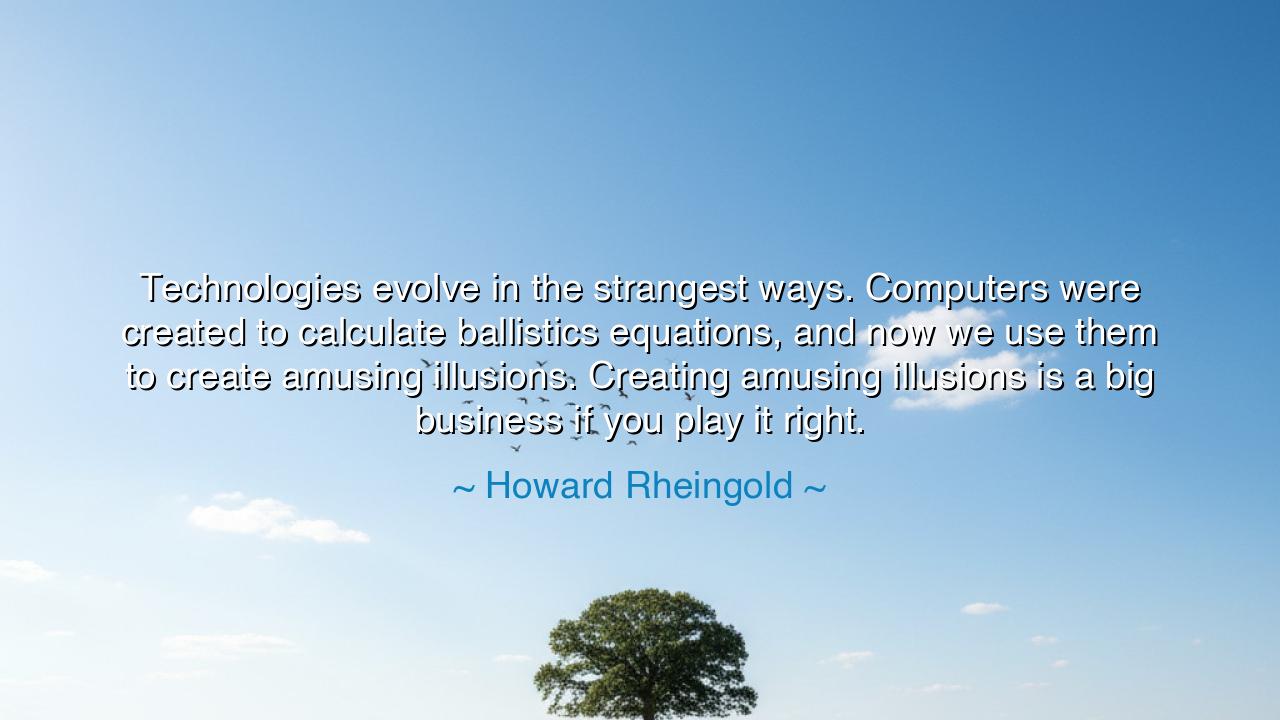
Technologies evolve in the strangest ways. Computers were created
Technologies evolve in the strangest ways. Computers were created to calculate ballistics equations, and now we use them to create amusing illusions. Creating amusing illusions is a big business if you play it right.






O Seekers of Wisdom, gather close, for the words of Howard Rheingold carry within them a profound reflection on the nature of technological evolution. "Technologies evolve in the strangest ways. Computers were created to calculate ballistics equations, and now we use them to create amusing illusions. Creating amusing illusions is a big business if you play it right." These words call to us from the future, yet they speak with the resonance of an eternal truth. The path of invention, as Rheingold wisely suggests, is not always one of steady, predictable progress. Technologies, born from necessity, often veer into unanticipated realms, and the very tools we create to serve practical purposes may one day become the instruments of our deepest distractions.
Let us think of the ancient world, where tools were first fashioned not for the purpose of amusement, but for survival. The first wheel, a marvel of craftsmanship, spun not to entertain but to transport, to move heavy burdens, and to carry warriors into battle. In time, however, its uses evolved, and the wheel became an instrument of creation and art—think of the potter’s wheel, the carriages of kings, the turning of fortunes. Necessity gave birth to invention, but invention, in its fullness, found its own path. So too did the technologies of our age—computers, forged in the fires of war, crafted first to perform complex calculations for ballistics equations—they became the harbingers of a new age, one where creation and illusion, once distant cousins, merged.
In our own time, as the hands of those who first built these digital tools fade into history, we marvel at how these machines, once bound to the service of science and war, now create the digital worlds of entertainment and illusion. The video games, the virtual worlds, the social media networks, they all stand as living examples of how technology, once a mere servant of logic and numbers, has been reshaped by the whims of culture into the very stuff of modern mythology. And indeed, creating amusing illusions has become a business—one of staggering proportions. From the silver screen to the screens of our phones, we are captivated by the world these computers have woven. It is a world that both delights and distracts, that entertains the mind, while often numbing the soul.
In the grand sweep of history, this is but a footnote—a mere moment in the arc of human ingenuity. But let us pause, O Seekers, to reflect upon this strange dance between necessity and whim. Just as the bow, once a weapon of war, became the instrument of music, so too do the tools we create find their own paths, leading us to places we could not have anticipated. The builders of the first computers could not have foreseen a world where those very machines would serve not only the defense of nations but also the quest for entertainment and digital delight. Yet this is the nature of human creativity: to adapt, to reshape, to mold the very tools we create to serve new, sometimes unexpected purposes.
In this, there is a great lesson for us. We are creators by nature, and the things we fashion often transcend our intentions. Let us consider the power of choice in how we wield the tools of our time. We live in an age where amusing illusions are all around us, and it is all too easy to be swept away by the tide of entertainment, to lose ourselves in the digital worlds we have built. But Rheingold’s words remind us that the evolution of technology is not inherently good or evil—it is a reflection of how we choose to use it. Our tools may bring joy and pleasure, but they may also serve as a trap that keeps us from greater truths. To wield technology is to walk a delicate line: to create, yes, but to create with purpose and awareness, to ensure that the illusions we craft do not consume the deeper parts of our spirit.
Take, for example, the story of the great inventor, Thomas Edison. His inventions, born out of necessity—the electric light, the phonograph, the motion picture camera—changed the world in ways both profound and unforeseen. But Edison’s work was not only practical; it was also deeply tied to the pursuit of illusion—the theater of light and sound that dazzled and entranced the masses. Yet, in his pursuit of innovation, he was also keenly aware of its power. He knew that technology must be used responsibly, that its evolution, though unpredictable, could lead to either enlightenment or distraction. Edison’s balance of invention and responsibility is a lesson we must carry forward into our own age of digital marvels.
And so, O Seekers, let us approach the strange evolution of our technologies with both awe and caution. The machines we create, from the humblest of tools to the mightiest of digital wonders, may lead us to unforeseen destinations. They may bring us closer to the heavens of entertainment, or they may drag us into the labyrinth of illusion. Yet, in the end, it is our purpose, our choices, that will determine whether these technologies serve us or we, in our folly, become their servants. Use them with wisdom; create with purpose, and remember that even in the pursuit of pleasure and amusement, we must not lose sight of the greater truths that lie beyond the screens. Let us shape our tools, rather than be shaped by them.






AAdministratorAdministrator
Welcome, honored guests. Please leave a comment, we will respond soon